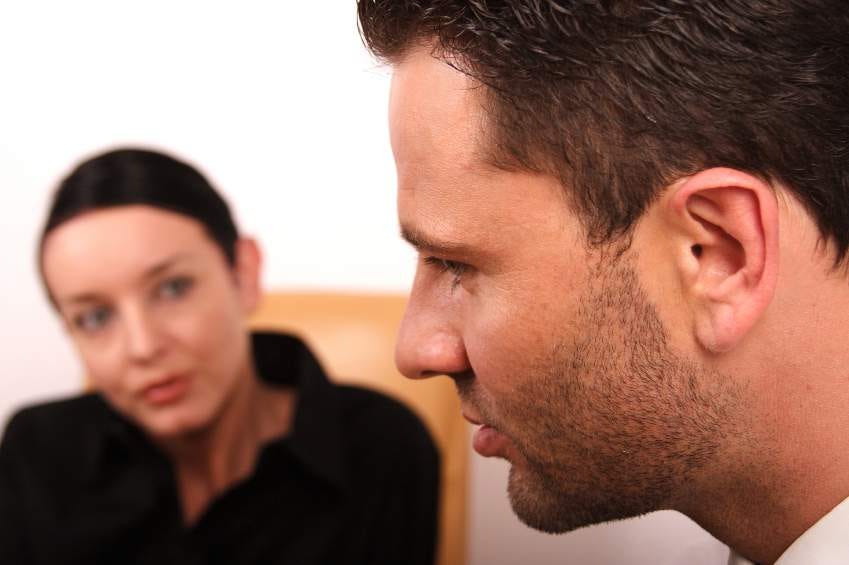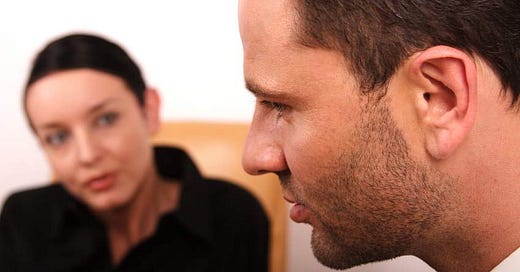
Editor's Note: This a joint blog post by Vlad Dolezal and Ali Luke.
“Does my butt look big in this?”
You rely on your friends for honest advice. Sometimes brutally honest. You might be willing to show a close friend (or a coach, or a partner) something which is very much a work-in-progress -- something which you’re not sure about unleashing on the world.
Whether that’s a new and daring outfit, or an epic novel, you want to know whether it’s working. Whether it’s good -- or whether it needs a bit more work.
You need brutal honesty.
By “brutal”, we don’t mean “cruel”. We mean honesty that tells it like it is -- even when that truth is hard to speak, and hard to hear. Because bad advice, “nice” advice, can be utterly destructive.
If those bright pink jeans were pretty unflattering, wouldn’t you want to know before you went out on a date?
And if your business model was wonky, wouldn’t you want to know before you invested a ton of money and energy into pursuing it?
How to Ask For Brutally Honest Advice
As I’m sure you’ve experienced, getting some people to give you a single negative comment on you or your work is harder than pulling an elephant’s tooth with tweezers.
But brutal honesty is valuable. Really valuable. So how exactly do you get people to give it to you straight and without sugar coating?
To answer that, first consider why friends fail to be brutally honest with you. The most common causes are that they are:
afraid of offending or upsetting you
afraid of draining your motivation by being too pessimistic
afraid you will have a negative reaction to their input and this will hurt your friendship
afraid that you really just want reassurance or support, not constructive criticism
afraid of seeming unkind
afraid that they might be wrong [?]
So just ask them to be brutally honest with you. Explain why it is important to you. Explain that you will not get angry with them. Explain that if their comments are enough to drain your motivation, then it’s probably a good thing they told you up front, before you invested any more energy into it.
Further, appeal to their friendship, and explain that they would hurt you more by not being brutally honest with you. Because you are then likely to waste your time, energy and maybe even money on something that might never have been a good idea in the first place.
Now, you don’t have to act on any advice they give you. But being fully informed will help you make the best possible decision in the circumstances. And that’s all you can ask for.
Sometimes, your friends might not be the best people to ask. It can be hard to encourage loved ones to be truly honest (even if you get them to read the next section of this post...)
Both of us have had great feedback from acquaintances who don’t have a close relationship with us -- like online friends, or even helpful strangers on forums related to our business areas. You might well be able to find someone similar: ideally, look for people who you can swap advice with (e.g. you’ll read their blog posts and they’ll read your sales page).
How to Give Brutally Honest Advice
The flip side, offering brutally honest advice, is obviously much trickier than asking for it.
And as we will see in the next section, no matter how valuable brutal honesty can be, it’s not always the best approach. But it usually is, and here’s how to maximize your chances of getting a positive reaction when you offer it.
#1: Tell them you’ll be honest
Let’s say a friend, colleague or client comes to you, outlines their latest idea or shows you part of your work in progress, and eagerly asks, “So, what do you think?”
You want to be honest with them. So tell them that. Say “I’m going to be completely honest with you,” or ask them “Is it okay if I’m totally honest?” Make the terms of engagement clear, right from the start.
#2: Start and end with the good
Even if you think your friend’s idea is pretty unworkable, there’ll be something good to say. Whenever you’re offering feedback, it’s good to start and end on a positive note. (The Toastmasters do this with their speaker evaluations.)
If something is basically good but has a few flaws, make this clear right at the start. Say “I think this is a really solid business plan” or “I loved reading this blog post.” Don’t ever assume that people will know that their work is fundamentally sound: you need to tell them this, explicitly.
#3: Be constructive in your criticism
Don’t offer advice like “No-one will ever want to buy from that sales page” or “Your ebook will make people fall asleep.” Point out specific problems and, if you can, suggest solutions:
“The design makes the page look a bit scammy. Perhaps you could cut out the yellow highlighter?”
“The writing style seems very academic. Perhaps you could talk to the reader directly, using “you”, and bring in some personal anecdotes?”
#4: Tread very cautiously when offering unsolicited advice
Let’s say you spot that your friend has created a website where she’s selling handmade furniture. You might have all sorts of ideas about how she could improve everything from the site design to the shopping cart software.
If she’s not asked for your help, though, proceed with extreme caution. Few of us like to get brutally honest advice when we’ve not requested any feedback at all. If you’re in a situation where you feel like you absolutely, positively must speak up, you might want to check with a mutual friend first...
#5: Accept that they have the right to make their own decisions and mistakes
I was recently reading a thread on reddit with a man who was planning to speak up at the “speak up now or forever hold your peace” part of his brother’s wedding.
The reason? He thought his brother’s fiancee was not the right woman for him.
Now, the first obvious problem is that you should bring up something like this before the wedding, not during the ceremony.
But the man did that. No less than 5 times. And his brother heard the brutally honest advice, and still insisted on marrying his fiancee.
That would be a good point to stop and forever hold his peace. Because no matter how convinced you are that you are right and your friend is making a mistake, they have the right to make their own decisions.
So when you offer brutally honest advice, understand that your friend might not follow it. That’s okay. You can only make sure that they have all the relevant information when making their decision. The actual decision is up to them.
Once you’ve dispensed your brutally honest advice and your friend has acknowledged it, move on. This will help you remain a valuable advisor instead of turning into a pestering nag.
When Brutal Honesty Is Not The Best Approach
With all of that in mind, brutal honesty isn’t always the best approach.
When I (Vlad) did my first ever prepared speech at Toastmasters, I was, frankly, atrocious. My structure wasn’t very clear. I spoke too fast and mumbled. I fidgeted around. And the list goes on and on.
But that’s okay. Most people suck when they try giving their first speech in front of an audience. And the whole point of a place like Toastmasters is to get together and practice in a safe, friendly environment.
And so the feedback I received consisted mostly of pointing out the things I did right, with one or two points for improvement.
This helped reinforce the things I did right, and gave me something to focus on improving next. And it kept me motivated, instead of bringing me down by listing the dozens of things I did wrong.
So, sometimes, helping and encouraging your friends really is more important than pointing out every flaw in what they’re doing.
But next time someone asks you for feedback, or next time you need advice on something big and important, ask yourself whether it’s a good opportunity to practice brutal honesty. If money, health or relationships are on the line, it’s generally a good idea to speak up rather than to keep your doubts to yourself.
The comments are open - feel free to let us know your own experiences of brutal honesty, whether good or bad...




SACLUX COMPTECH SPECIALST helped me to recover my $35,000 bitcoins and $12,500 ethereum in 14 hours. An investment platform called PROF INVESTMENT scammed me of my money with the hope of getting double interest in retune after seeing some testimony of people on how they change people's lives. Not knowing that, the review was part of the scam. I got info about SACLUX COMPTECH SPECIALST from a close friend at my job. I was working as a hotel supervisor and I have a friend that always comes to take some drinks and shoots a few times a week. We got close and he get to talk about how SACLUX COMPTECH SPECIALST got his money recover that he lost to scam for good because he shared everything with me and i gotta know how the SACLUX COMPTECH SPECIALST changed his life, Not knowing that i have also fall into same scam investment and he gave me their contact and i got to contact them last week Wednesday and They got my work started sameday and i get to have the $35,000 bitcoins and $12,500 ethereum in my blockchain wallet back. God always sent someone to us for rescue when we thought all hope was lost and I can't stop thanking my new friend for introducing SACLUX COMPTECH SPECIALST to me that gave me relief. I am proud to share this with everyone and if you are out there and need to get help. All you need to do is to contact SACLUX COMPTECH SPECIALST.